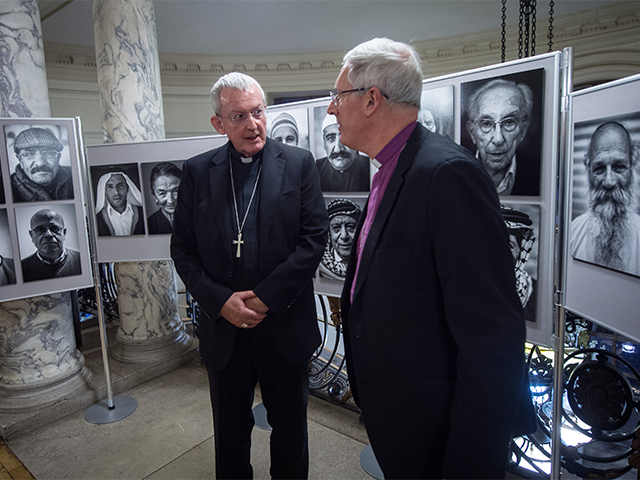
Bishop Declan Lang, Chair of the Holy Land Coordination tonight, Wednesday 1 November, addressed Britain’s Broken Promise: Time for a New Approach, an event organised by the Balfour Project at Westminster Central Hall to mark the Centenary of the Balfour Declaration.
Thank you for inviting me to address this important event tonight. I would like to start by sharing two brief memories of my most recent visit to the Holy Land;
The first was standing on a hillside in East Jerusalem looking out over Palestinian villages and Israeli settlements.
What struck me was how two communities divided by fear, distrust and misunderstanding, are in fact so physically close to one another. People living just a few miles apart are seen as strangers, foreigners or even enemies – separated by barbed wire and concrete walls.
It reminded me that even the distance from Tel Aviv to Gaza City is just fifty miles, about half the distance I travelled to be here tonight, and yet people in those two cities have little understanding or empathy for each other’s lives.
The other moment that stuck with me was meeting a Palestinian psychology student at Bethlehem University who described experiences that no young person should have to face: how she misses classes when she is held up at military checkpoints and she struggles to study against the sound of gunfire.
She told me “No matter how many times I get caught up in clashes, no matter how many times I see the wall, no matter how many times I get through the checkpoint, this is not ok, this is not normal, this is not how we are supposed to live.”
Her words echoed what I saw a few years earlier in the Israeli town of Sderot, on the border with Gaza. It has been targeted by thousands of rocket attacks, which have killed or injured dozens of civilians. Schools in Sderot are equipped with sirens in the classrooms and concrete shelters in the playgrounds – it is not how any child is supposed to live.
The Balfour Declaration envisaged two communities coexisting peacefully, and respect for the inalienable human rights of all. One hundred years later it is clear that this vision has not yet been realised – and people whose grandparents were not even born in 1917 are living with the consequences.
That is why, on this anniversary, we should not simply look back at Britain’s own historical responsibility to the Holy Land. But more importantly we should look forward to how, in light of that responsibility, we may help to ensure that the next generation of Israelis and Palestinians grow up in peace and dignity.
For people of faith our starting point is prayer. I hope that here in the UK faith communities will mark this historic moment not only by reflecting on the Holy Land’s central place in our beliefs, but by praying for the future of everyone who calls it their home.
Secondly, we all have a responsibility for raising awareness. It is easy to sit in this crowded hall, alongside others who are engaged with the realities of life in the Holy Land, and presume that this understanding is widely shared. But many people in our society see only a complex conflict, in a far off land, that is of little concern or relevance.
To become agents of change it is imperative that we inform others, while continually deepening our own knowledge, and challenging our own assumptions.
In particular we should be listening to the voices of those living in Israel and Palestine. When we asked Leila, the student in Bethlehem, for her message to people in the UK she simply replied: “come here, see and hear the reality, coming here changes your perspective.”
Thirdly our commitment and our awareness must translate into action.
One of the most significant things we can all do is to let our elected representatives know that the future of Israel and Palestine is something that matters to voters here. I’m encouraged that since our Bishops visited the Holy Land in January, over one hundred MPs have received correspondence from Catholics in their constituencies about the challenges we saw there.
Our decisions as consumers and travellers are equally important. Using ethical tour operators, buying products that support local families and making informed choices about where goods come from are all practical steps that have a real impact.
We also need to get behind projects that are building bridges between ordinary people in the Holy Land. Earlier this year I had a chance to visit the Tent of Nations, a family-owned farm not far from Bethlehem, which hosts camps and volunteering opportunities for people of different backgrounds to learn, share and better understand one another.
Their motto is simple: we refuse to be enemies.
On this anniversary we are called to share in that rejection of division, conflict and hate.
And after one hundred years of failure, we must recommit to prayer, awareness and action until the shared vision of communities coexisting, in peace and with justice, is finally a reality.
Here is a the full speech, (from above), given by Bishop Declan Lang